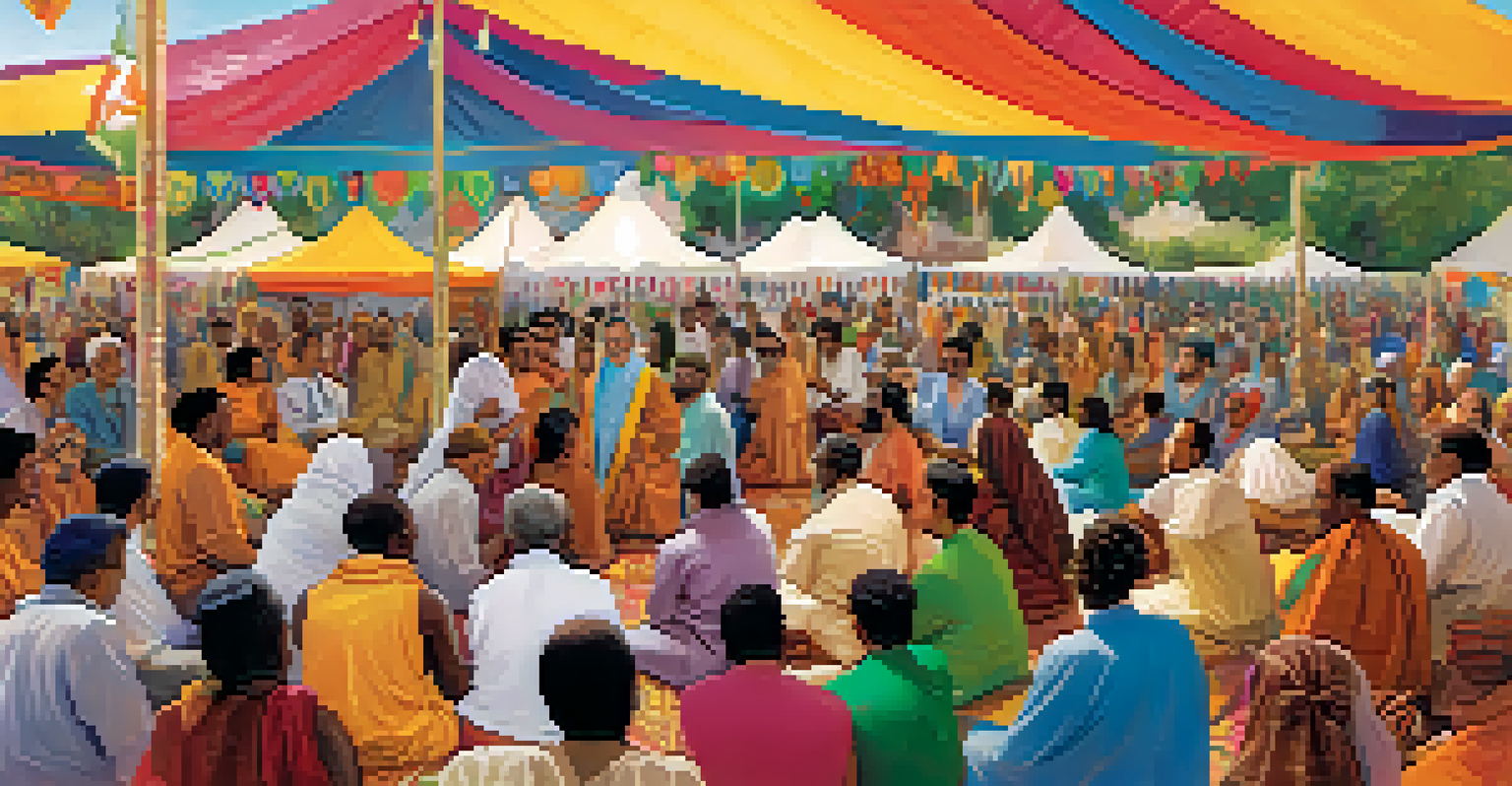The Role of Spirituality in Fostering Global Citizenship Values

Understanding Spirituality and Its Core Concepts
Spirituality often transcends religious boundaries, focusing on personal growth and connection with something greater than oneself. It encompasses values such as compassion, empathy, and a deep sense of belonging. By recognizing our interconnectedness, spirituality lays the groundwork for fostering global citizenship.
We are not human beings having a spiritual experience. We are spiritual beings having a human experience.
Many people view spirituality as a way to explore life's deeper meanings and questions. This exploration can lead to a more profound understanding of our place in the world and our responsibilities towards others. Through spiritual practices like meditation or mindfulness, individuals can cultivate a sense of awareness that extends beyond their immediate surroundings.
Ultimately, spirituality encourages us to adopt a broader perspective, one that includes respect for different cultures and beliefs. This mindset is essential for promoting global citizenship, as it nurtures tolerance and appreciation for diversity—key pillars in an increasingly interconnected world.
The Intersection of Spirituality and Global Citizenship
Global citizenship is the idea that individuals have responsibilities not just to their local communities but to the world at large. Spirituality plays a crucial role in shaping this mindset, as it encourages us to act with compassion and empathy towards all living beings. When we view ourselves as part of a larger tapestry, our actions can reflect a commitment to the well-being of others.

By integrating spiritual values into our understanding of global citizenship, we can foster a sense of duty to advocate for social justice and environmental stewardship. For instance, many spiritual traditions emphasize the importance of caring for the Earth, which aligns perfectly with the principles of sustainability and ecological responsibility. This connection can inspire collective action toward a healthier planet.
Spirituality Fosters Global Citizenship
Spirituality encourages compassion and interconnectedness, essential values for promoting global citizenship.
Moreover, spirituality can motivate individuals to engage with global issues on a deeper level. When we feel a spiritual connection to humanity, we may be more compelled to participate in movements that promote peace, equality, and human rights. This engagement not only benefits those affected by these issues but also enriches our own spiritual journeys.
Spiritual Practices That Promote Global Awareness
Certain spiritual practices can significantly enhance our global awareness and sense of responsibility. For example, meditation often encourages individuals to reflect on their values and the impact of their actions on the world. This self-reflection can lead to a greater understanding of global issues and a desire to contribute positively.
The greatest gift of human beings is that we have the power of empathy.
Additionally, prayer or intention-setting can be a powerful way to connect with global challenges. Many people find that praying for peace, healing, or justice helps them feel more connected to those facing difficulties around the world. This sense of solidarity can spur individuals into action, whether through volunteering, advocacy, or simply spreading awareness.
Practices like community service, which are often rooted in spiritual traditions, also foster a sense of global citizenship. When we serve others, we experience firsthand the challenges they face, broadening our understanding and compassion. This direct engagement can ignite a passion for making a difference, both locally and globally.
Cultivating Empathy Through Spirituality
Empathy is a cornerstone of both spirituality and global citizenship. Spiritual teachings often emphasize the importance of understanding others' experiences and feelings, which can lead to a more compassionate worldview. This empathetic lens helps us appreciate the struggles of individuals from diverse backgrounds, fostering a sense of shared humanity.
Practicing empathy can also dismantle prejudice and ignorance, paving the way for inclusive communities. When we approach others with an open heart and mind, we create space for dialogue and understanding. This is crucial in a world where cultural differences can sometimes lead to conflict, making empathy a vital tool for global harmony.
Practices Enhance Global Awareness
Engaging in spiritual practices like meditation and community service deepens our understanding of global issues.
Moreover, spiritual leaders and communities often champion empathy through their teachings and actions. By prioritizing compassionate engagement, they inspire others to follow suit, creating a ripple effect that promotes global citizenship. Ultimately, cultivating empathy through spirituality can transform how we relate to each other on a global scale.
The Role of Spiritual Communities in Global Citizenship
Spiritual communities provide a supportive environment for individuals to explore their values and responsibilities as global citizens. These communities often engage in dialogue about pressing global issues, encouraging members to take action based on shared spiritual principles. This collective approach can amplify individual efforts, creating a more significant impact.
Many spiritual organizations actively participate in humanitarian efforts, advocating for social justice and environmental sustainability. For example, interfaith groups often unite diverse beliefs to address common challenges, showcasing how spirituality can bridge divides and foster collaboration. Through these actions, members not only contribute to global well-being but also strengthen their connections within the community.
Additionally, spiritual communities can serve as platforms for education and awareness. By hosting events, workshops, or discussions centered on global issues, they empower individuals to learn and grow. This knowledge-sharing is essential for nurturing informed global citizens who are prepared to tackle the challenges of our time.
Overcoming Challenges to Global Citizenship Through Spirituality
Despite the potential of spirituality to enhance global citizenship, challenges such as cultural differences and misinformation can hinder progress. Spirituality can help address these barriers by promoting understanding and respect among diverse groups. By encouraging open dialogue, spirituality fosters an environment where differences can be celebrated rather than feared.
Moreover, the values instilled through spiritual practices can guide individuals in navigating complex global issues. When faced with challenges such as climate change or social inequality, a spiritual lens can inspire solutions rooted in compassion and equity. This perspective can motivate individuals to seek collaborative, rather than adversarial, approaches to problem-solving.
Empathy as a Global Connector
Cultivating empathy through spirituality helps break down cultural barriers and fosters inclusive communities.
Finally, spirituality can provide resilience in the face of adversity. Global issues can feel overwhelming, but spiritual beliefs often offer comfort and hope. By grounding ourselves in our values, we can find the strength to advocate for change, inspiring others to join us on this journey toward a more compassionate world.
The Future of Spirituality and Global Citizenship
As we move forward in an increasingly interconnected world, the relationship between spirituality and global citizenship will continue to evolve. New generations are seeking meaning and purpose, often looking to spirituality as a guide for their roles as global citizens. This trend highlights the importance of integrating spiritual values into education and community initiatives.
Moreover, the rise of digital technology allows spiritual teachings and practices to reach a broader audience than ever before. Online platforms can facilitate discussions about global issues, fostering a sense of community among individuals from diverse backgrounds. This connectivity can enhance our collective commitment to global citizenship by sharing experiences and perspectives.

Ultimately, the future of spirituality and global citizenship is intertwined. As more people embrace spiritual principles that prioritize empathy, compassion, and interconnectedness, we can hope to see a world that values and nurtures global citizenship as a shared responsibility.